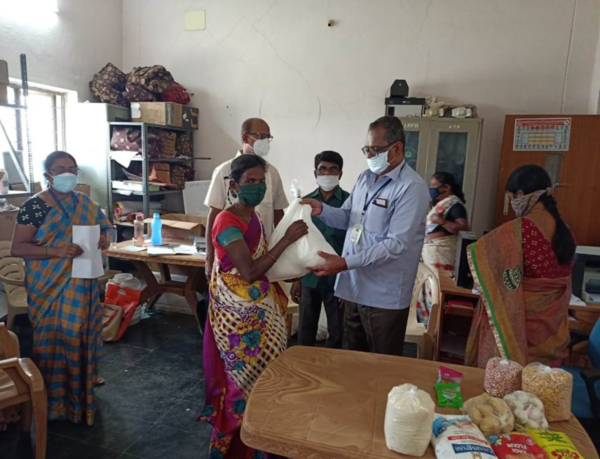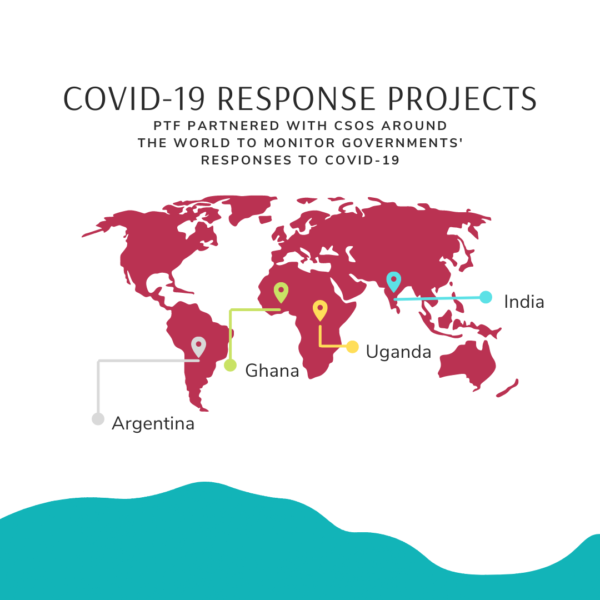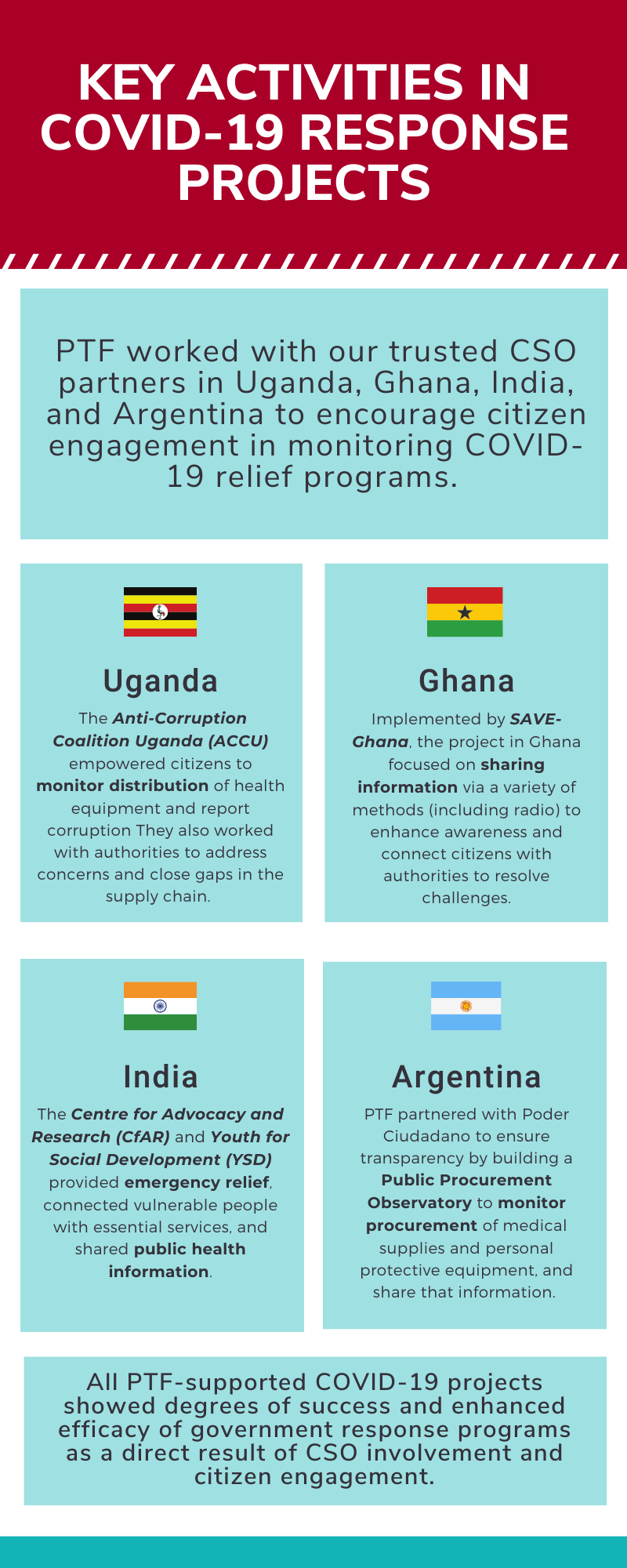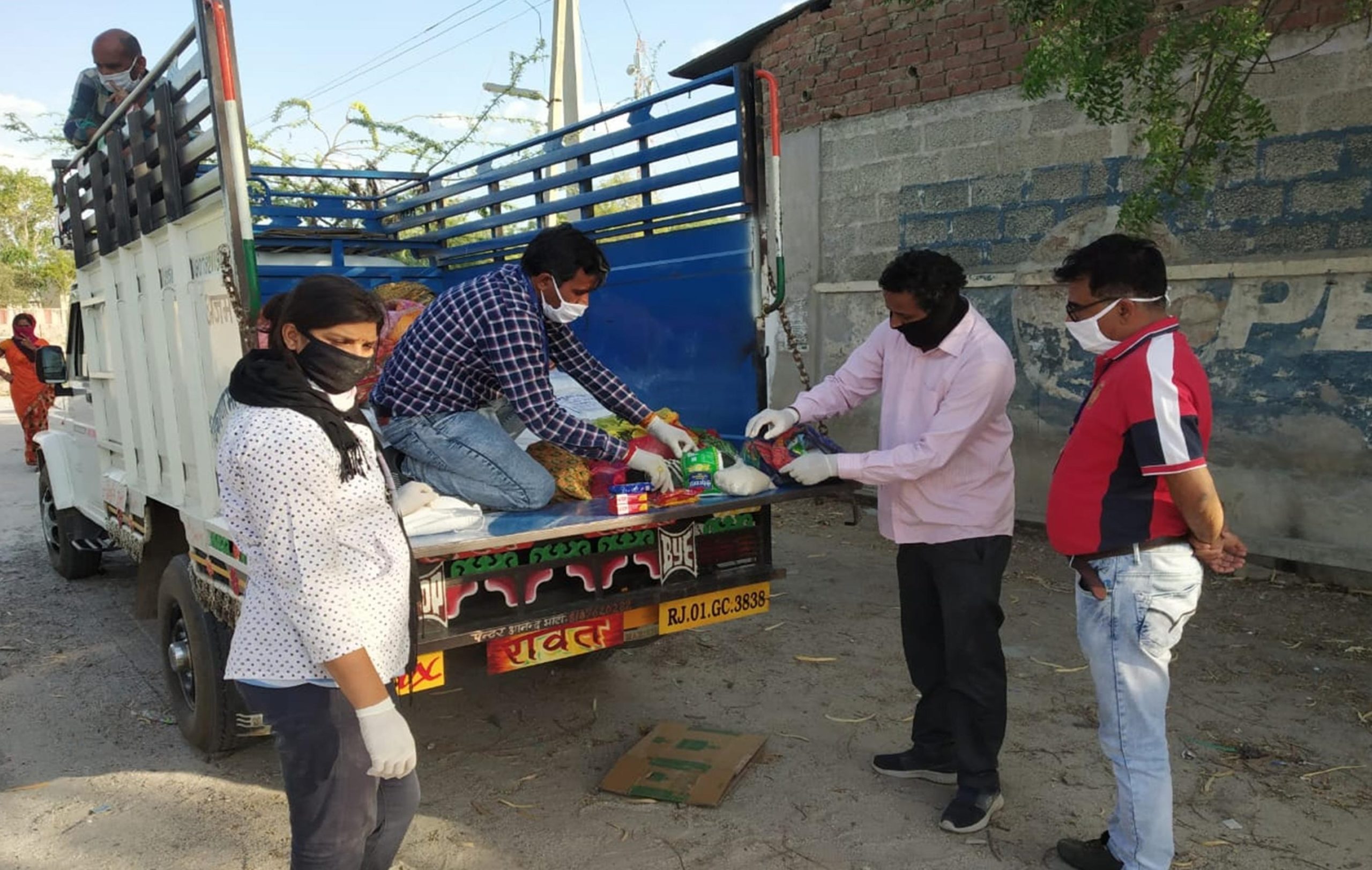
A comprehensive overview of PTF’s COVID-19 response program demonstrates the value of civil society involvement and citizen engagement
As COVID-19 swept the globe, the Partnership for Transparency Fund (PTF) adjusted our operations to meet the moment and directly support civil society efforts to both assist and monitor emergency response programs, ensuring help reached those who needed it most. PTF’s COVID-19 response portfolio has included support for civil society organization (CSO) partners in four countries, working on five projects designed to encourage citizen engagement in monitoring COVID-19 relief programs. These projects have not only successfully achieved their stated objectives, but demonstrate the way in which CSO involvement enhances the efficacy of government response programs which may prove essential in future vaccination campaigns.
Each of the below projects attempted to address the key challenges facing target communities in the first wave of pandemic response: access to reliable information on COVID-19 and preventative measures, the opacity of public procurement and expenditures enabled by rapid response that bypassed traditional safeguards, and inequitable distribution of relief measures. By working with civil society partners and local citizens, PTF’s projects staged interventions designed to mitigate these challenges and implement solutions to lessen the impact of COVID-19 on vulnerable communities, while encouraging citizens to hold government officials accountable to the communities they serve.
These projects demonstrated the ways in which, due to their unique connections to and positions within local communities, CSO involvement can help governments address the key corruption challenges hindering pandemic response and vaccination programs. Further, they show the value of CSO engagement at both the grass roots and national level, and in dealing with practical issues on the ground as well as at the highest levels of the national response. CSOs have been proven effective in generating greater transparency and accountability in: communication, procurement, distribution, public expenditure, grievance redress, and reporting. These same distinguishing characteristics make civil society groups essential partners in carrying out vaccination campaigns when standard government accountability mechanisms have been strained by the speed with which goods and services are bought and distributed during the pandemic. PTF’s work with local partners, and lessons learned from COVID-19 monitoring projects have already been applied to third-party monitoring of vaccination campaigns in order to ensure efficiency and transparency in national programs.

Project Overviews:
Uganda
PTF partnered with the Anti-Corruption Coalition Uganda (ACCU) and Rotary Club Kasangati to implement a program based in the Kasangati Health Centre IV. The project focused on supporting civic engagement in the implementation of COVID-19 funds and resources in Uganda with the aim of contributing to increased efficiency and economy. ACCU and the Rotary Club focused their interventions on activities designed to monitor and share information. This included training health care workers and community members on COVID-19 preventive measures, monitoring procurement and distribution of personal protective equipment, engaging citizens in monitoring beneficiaries and amounts of public expenditures, working with investigative journalists to unearth corruption and share information publicly, and sharing collected information with duty bearers through publications and meetings in order to close the feedback loop and promote constructive engagement. In particular, investigative journalists produced two videos on uncovered corruption in the government’s COVID-19 response. These were shared with roughly 40,000 people, and a press conference on government actions reached over 150,000.
As a result of this project, implementation of the government’s COVID-19 response program was improved, and accountability enhanced due to citizens’ awareness of their rights and responsibilities. These interventions also improved the efficiency of pandemic response measures by investigating, and finding solutions to, irregularities in the process of procuring and distributing medical supplies. Media interventions as well, further enhanced transparency in Uganda’s COVID-19 response by ensuring citizens had access to the information needed to hold officials accountable. Because the project was designed and implemented at a grassroots level, with on-the-ground actors, citizens were more effectively engaged in the monitoring process, and CSO partners were able to share information in an appropriate cultural context. All objectives were accomplished over the course of six months, and with a grant of $10,000.

Ghana
In Ghana’s Sisaala East and West districts, PTF’s long-time CSO partner SAVE-Ghana implemented a project to increase efficiency and effectiveness of the government response to the pandemic. SAVE-Ghana and PTF focused on supporting Ghana Health Services (GHS) in its efforts to provide information on COVID-19 preventive measures, as well as procurements and distribution of supplies. SAVE-Ghana staff conducted visits to remote villages with a truck equipped with megaphone to inform local populations of the need for frequent handwashing, social distancing, and where to go for financial help, medical care, and tests. They also promoted citizen-led monitoring of public expenditures on COVID-19 to analyze funds allocated for pandemic response, while working with multiple stakeholders including media, community leaders, and service providers to unearth and broadcast poor governance practices, inefficiencies, and waste in the implementation of COVID-19 response. This project also involved a large-scale information campaign conducted through local radio stations and interactions. In particular, SAVE-Ghana enlisted the help of a popular local radio program, entitled “The People Must Know,” to share information, answer questions about COVID-19, and facilitate conversation between citizens and duty bearers. These efforts were supplemented by SAVE-Ghana’s ongoing dialogue with authorities to provide feedback to improve implementation of COVID-19 response programs, based on the findings from monitoring work.
The project activities—concentrated in remote locations where local populations tend toward skepticism of external assistance—resulted in increased awareness of and access to information on COVID-19 prevention, enhanced transparency and accountability of public expenditures, improved economy of procurement of medical supplies, and the establishment of a feedback loop between citizens and local authorities. PTF provided $10,000 to facilitate these activities.
India
In India, PTF worked with two civil society groups to implement two projects in different regions of the country. One project, implemented by Youth for Social Development (YSD) in Odisha, provided food and hygiene kits to migrant families, promoted community awareness of COVID-19 and social safety net benefits to help affected families stay safe and access the resources available to them. YSD also monitored and shared information on COVID-19 response expenditures to increase transparency and accountability, and engaged directly with twenty different village councils. The Indian Development and Relief Fund (IDRF) provided $20,000, and PTF supplemented $3,000; the resulting work benefitting roughly 1,000 households.
In Rajasthan, the Centre for Advocacy and Research (CfAR)’s proximity to citizens proved essential in guiding government disbursement of relief services. CfAR’s COVID-19 response programs, supported by PTF and IDRF, focused on targeted citizen outreach and support, providing emergency relief such as food and hygiene kits for migrant workers stranded far from home, while also connecting them to local social safety nets. CfAR also worked closely with local government and community officials to ensure accurate and reliable public health information was shared. In addition to emergency relief activities, CfAR worked with local government officials to identify and assist marginalized or excluded groups, such as migrant workers, to ensure these vulnerable populations also received access to benefits. By transferring supplies and information directly to citizens, CfAR demonstrated the importance of CSO involvement in relief efforts. As a result, CfAR has been specifically recruited to assist in a vaccination campaign. IDRF provided $10,000, PTF supplemented with $3,000, and CfAR’s work reached 1,040 households across the region.
Both of the above projects resulted in reduced risk of COVID-19 infections by raising awareness of and compliance with COVID-19 preventive measures, tracing, and treatment information; lessened levels of hunger among vulnerable populations while they transitioned to government support programs; increased trust between communities and government authorities by facilitating information-sharing and working together on key response efforts; improved implementation of government response programs by monitoring for irregularities and assisting with outreach; and improved inclusivity of health and social safety net services by identifying vulnerable populations and reducing exclusion errors.
Argentina
The rapid pace of COVID-19 response in Argentina has meant that typical transparency measures throughout the procurement process have been sidestepped, further clouding an already opaque system. Poder Ciudadano is working to ensure transparency in the pandemic response by establishing a Public Procurement Observatory that compiles all open-source information on procurement contracts of medical equipment and supplies. It is the only comprehensive national monitoring program, and to date has publicized more than seven hundred procurement actions by more than sixty public agencies valued at US$195 million. Under the project, Poder Ciudadano has also prepared and published a methodology for CSO engagement in monitoring procurement, storage, distribution, and delivery of medical supplies. Further, it is developing a network of local CSOs to monitor vaccine delivery and distribution, especially to vulnerable populations. It has also published a regulatory risk map of the vulnerabilities to fraud and corruption of the non-transparent emergency procedures. Based on these initiatives, Poder Ciudadano is preparing recommendations for improving the transparency and effectiveness of COVID-19 response and vaccination programs.
Poder reports that the project has had a positive impact with government, the media, CSO community, and sister institutions in other countries. Sub-national CSOs are developing their own observatories and show interest in applying the monitoring methodology. Through requests for information, Poder has identified more than one hundred contracts not listed in any portal. Poder has also been working with government authorities to improve reporting. In October 2020, it held a meeting with over two hundred participants, including the president of the General Audit Office, Prosecutor of Administrative Investigations and Deputy General Trustee of the Nation.

Advocacy and Knowledge-Sharing
In addition to its programmatic support, PTF undertook a series of knowledge-sharing and advocacy activities to highlight the work of its CSO partners. The products written and shared focus on the value of citizen engagement and share stories from the frontlines of COVID-19 response.
Highlights include:
- International Anti-Corruption Conference (IACC): PTF Chief Technical Adviser Vinay Bhargava hosted a panel discussion on lessons learned from its COVID-19 monitoring projects, and the important role of civil society in widespread relief efforts. The event, titled: Making Progress on SDG16 Good Governance Targets During and Beyond the Pandemic: Report from the Frontlines in Africa and Asia, focused on how stakeholders can work together to promote the SDG16 targets during and beyond the pandemic.
- Asian Development Bank (ADB) Governance Brief: Bhargava also wrote a governance brief for the ADB explaining why civil society organizations (CSOs) in Asia and the Pacific have an important role in helping address the health, social, and economic crises caused by the coronavirus disease (COVID-19) pandemic.
- Organization for Economic Cooperation and Development Forum: PTF hosed a panel discussion as part of the annual OECD Global Integrity and Anti-Corruption Forum. The discussion, Integrity in COVID-19 Response: Civil Society Organizations’ Value Add, featured representatives from three of PTF’s CSO partners in Uganda, India, and Argentina to discuss their COVID-19 response work.
- ADB Panel: Vinay Bhargava participated in an event hosted by the ADB: Promoting Equity and Good Governance in COVID-19 Vaccine Deployment. The event focused on ways to address challenges that may arise in immunization programs and vaccination coverage, such as equity, safety, community resistance, transparency and accountability, responsiveness, and corruption.
- PTF also published a series of blog posts on the importance of CSO involvement in COVID-19 response, and the value of citizen engagement.
- Maximizing Citizen Engagement to Beat COVID, Richard Stern
- Argentine CSO Demonstrates Power of Citizen Engagement in COVID-19 Response, Dan Ritchie
- Equitable COVID-19 Vaccination: How CSOs Can Help Make It Happen, Rachel Ansley
- Ensuring Good Governance in COVID-19 Vaccination, Vinay Bhargava (originally published on World Bank Blogs)
- How to Monitor Procurement During a State of Emergency: 4 Lessons Learned from Argentina, Karina Kalpschtrej, Melisa De Urieta, José Bisillac, Sabrina Battilana
- Civil Society Organizations Can Be a Powerful Tool in Getting People Vaccinated, Vinay Bhargava and Chris Morris (originally published on Asian Development Blogs)
Moving Forward
Upon review, all PTF-supported COVID-19 response projects showed degrees of success and enhanced efficacy of government response programs as a direct result of CSO involvement and citizen engagement. Further, the lessons learned from these projects are all applicable for vaccine distribution work. These CSOs have shown that civil society and citizen engagement can make a difference by helping with vaccine access, education to overcome hesitancy, monitoring equitable and corruption free delivery; two-way communications between service providers, policy and decision makers and community members; and changing behaviors. They have also demonstrated that involving service providers and duty bearers in the conversation helps to establish the feedback loop that will ultimately create sustainable change.
Ultimately, these projects show that there is great value in scaling the COVID-19 response projects to adjust to vaccination campaigns—a process PTF has already begun—and further analyzing the lessons learned from these projects can optimize such efforts.
For updates, follow the Partnership for Transparency on Twitter @PTFund and on Facebook at Partnership for Transparency Fund.

